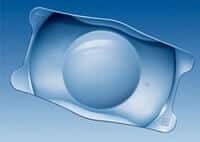Phakic lens implantation is an effective way to relieve high myopia, hyperopia, and astigmatism.
What is a phakic lens?
A phakic lens stands for a lens made of a special material fully compatible with the eye tissue and having the necessary optical properties. In its essence, correction with a phakic lens is similar to correction with contact lenses. The difference lies in the fact that contact lenses are placed on the cornea, while phakic lenses are implanted into the posterior or anterior chamber of the eye, preserving the natural lens. Phakic lenses consist of an optical part that corrects myopia, hyperopia, or astigmatism and a supporting part that allows the lens to be reliably fixed inside the eye.
General information
Phakic lens implantation, like any other vision correction method, has the same goal: changing the optic power of the eye so that light rays reach the retina precisely.
Benefits of phakic lens implantation at Eximer Ophthalmology Clinic
- A unique opportunity to gain good vision in 10-15 minutes for people with myopia, hyperopia, and high astigmatism.
- There is no risk of postoperative astigmatism because no stitches are required. The lens is implanted with an injector through a 1.8 mm micro-access, which is self-sealing afterward.
- There is no need for hospitalization. The surgery is done in a single day and the patient can go home the same day.
- Interventions are performed on unique microsurgical equipment in compliance with all world standards.
- Eximer Ophthalmology Clinic applies phakic lens from STAAR, an American-Swiss company, one of the world’s leading developers in ophthalmosurgery.
- Phakic lenses are developed from an innovative material called collamer, which is fully biocompatible with human eye tissues and replicates the natural features of the human eye to the fullest extent possible.
- Phakic lenses protect the retina from the negative UV impact.
- Postoperative restrictions are minimal and mostly relate to hygienic procedures.
- The parameters of the phakic lens are precisely estimated following a thorough diagnostic examination.
- The intervention is performed by top-class eye surgeons with extensive experience. The impeccable result during lens implantation is a major component of successful treatment.
- Phakic lens implantation is highly effective when the natural accommodation of the eye is still present, and lenses can be implanted into the eye without removing the natural lens.
- Intraocular lenses, unlike contact lenses, do not require any maintenance and are not felt in any way.
Who is eligible for phakic lens implantation?
- People with high myopia (up to -25 diopters);
- People with high hyperopia (up to +20 diopters);
- People with high astigmatism (up to 6 diopters);
- People with thin corneas, when other methods cannot be used.
Contraindications to phakic lens implantation are as follows
- Corneal opacity;
- Cataract;
- High intraocular pressure, glaucoma;
- Retinal or vitreous body disorders that either prevent good vision or require surgery in the posterior segment of the eye;
- Previous retinal, vitreous body, or anti-glaucoma surgery.
How is a phakic lens fitted?
The parameters of a phakic lens are adjusted individually for each patient. When selecting a phakic lens, the specialists at Eximer Ophthalmology Clinic look at different aspects: the patient’s visual state, age, lifestyle, and occupation. Our experts are certified by the companies producing the intraocular lenses and are experienced in fitting and implanting phakic lenses.
Can a phakic lens be removed afterward?
Phakic lens implantation is unique as it is one of the few completely reversible interventions in refractive surgery. If necessary, the lens can be safely removed from the eye without damaging its structure and function.











